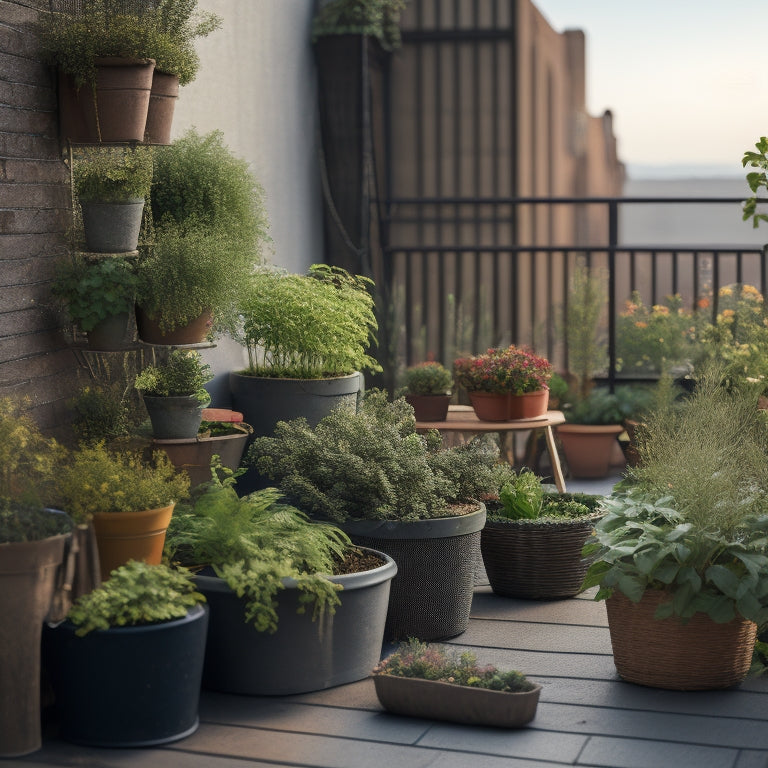
3 Tips for Fertilizing Rooftop Herb Gardens
Share
When fertilizing your rooftop herb garden, choose a balanced, water-soluble fertilizer specifically designed for container gardens. Opt for an organic option to promote microbial activity and gradual nutrient release. Time your fertilization carefully to avoid over-fertilization, considering your herbs' specific needs and growth stages.
Choose the Right Fertilizer Type
When selecting a fertilizer for your rooftop herb garden, you'll want to opt for a balanced, water-soluble formula that's specifically designed for container gardens. This type of fertilizer will provide your herbs with the necessary nutrients without harming their roots. You'll also need to decide between organic options and synthetic choices. Organic fertilizers, such as fish emulsion or compost tea, release nutrients gradually and promote beneficial microbial activity. Synthetic fertilizers, on the other hand, offer a quick burst of nutrients but can harm the environment.
In terms of application, you'll need to choose between slow release and liquid formulas. Slow release fertilizers provide a continuous supply of nutrients over time, while liquid formulas offer a rapid solution. Consider using a combination of both to provide your herbs with a well-rounded diet.
Fertilize at the Right Time
Now that you've chosen the right fertilizer for your rooftop herb garden, it's time to determine the best schedule for application. Avoid excessive fertilization, as this can harm your plants and the environment. Consider organic options, which release nutrients slowly and promote healthy soil biota.
To ensure ideal fertilization, consider the following schedule:
| Fertilizer Type | Application Frequency | Timing |
|---|---|---|
| Balanced fertilizer | Every 2-3 weeks | During active growth |
| High-phosphorus fertilizer | Once a month | During blooming or fruiting |
| Compost tea | Every 1-2 weeks | During active growth |
| Fish emulsion | Every 1-2 weeks | During active growth |
| Worm casting | Once a month | During active growth |
Remember to adjust the frequency and timing based on your specific herbs' needs and growth stages. Always follow the manufacturer's instructions and start with a small dose to avoid excessive fertilization. By fertilizing at the right time, you'll promote healthy growth, prevent nutrient deficiencies, and enjoy a bountiful harvest from your rooftop herb garden.
Balance Nutrients for Healthy Growth
To achieve best growth, you'll want to strike a balance between three primary macronutrients - nitrogen, phosphorus, and potassium - as well as secondary micronutrients like calcium, magnesium, and sulfur. This balance is essential, as it directly affects nutrient absorption and overall plant health.
Here are three key considerations to keep in mind:
-
Soil pH: Make sure your fertilizer is formulated for your soil's specific pH level. If your soil is too acidic or alkaline, it can limit nutrient absorption.
-
Nutrient ratios: Aim for a balanced fertilizer with a ratio of 10-10-10 (nitrogen-phosphorus-potassium). This will provide your herbs with the necessary nutrients for healthy growth.
-
Micronutrient boost: Consider adding micronutrients like calcium, magnesium, and sulfur to your fertilizer regimen. These micronutrients play a vital role in plant development and can help prevent deficiencies.
Frequently Asked Questions
Can I Use Fertilizer Specifically Designed for Indoor Plants?
'Absence of evidence doesn't mean evidence of absence.' You can use fertilizer for indoor plants, but consider the type: balanced, water-soluble, or organic. Verify it's compatible with your rooftop herbs, and opt for a mild, slow-release formula to avoid burning tender roots.
Will Organic Fertilizers Attract Pests to My Rooftop Garden?
You'll be relieved to know that organic fertilizers are less likely to attract pests to your rooftop garden, as they promote healthy plant growth without artificial additives, making pest prevention a natural byproduct.
How Often Should I Fertilize My Rooftop Herb Garden During Winter?
'A million things can go wrong if you fertilize too much, but during winter, you'll want to fertilize your rooftop herb garden about once a month, as plants grow slower in cold winter conditions, requiring less fertilizer frequency for best winter care.'
Are There Any Fertilizers That Can Help With Water Retention?
You'll find fertilizers containing humic acids, mycorrhizal fungi, and worm castings that enhance water retention, promoting soil health, robust root development, and efficient nutrient absorption, ultimately liberating your rooftop herbs from hydration stress.
Can I Fertilize My Rooftop Herb Garden During Extreme Weather Conditions?
"As you gaze out at your parched rooftop garden, don't let extreme weather conditions stop you from fertilizing - time your application strategically to avoid washaways, and choose a fertilizer that'll help your herbs thrive despite the elements."
Related Posts
-

Why Choose Cinder for Your Rooftop Garden Planters
You choose cinder for your rooftop garden planters because they offer a unique combination of durability, versatility...
-

Why Choose Cinder for Your Rooftop Garden Planters
You choose cinder for your rooftop garden planters because they offer a unique combination of durability, versatility...
-

Why Choose Cinder for Your Rooftop Garden Planters
You choose cinder for your rooftop garden planters because they offer a unique combination of durability, versatility...
-

Why Choose Cinder for Your Rooftop Garden Planters
You choose cinder for your rooftop garden planters because they offer a unique combination of durability, versatility...
-

Why Choose Cinder for Your Rooftop Garden Planters
You choose cinder for your rooftop garden planters because they offer a unique combination of durability, versatility...
-

Why Choose Cinder for Your Rooftop Garden Planters
You choose cinder for your rooftop garden planters because they offer a unique combination of durability, versatility...
-

Why Choose Cinder for Your Rooftop Garden Planters
You choose cinder for your rooftop garden planters because they offer a unique combination of durability, versatility...
-

Why Choose Cinder for Your Rooftop Garden Planters
You choose cinder for your rooftop garden planters because they offer a unique combination of durability, versatility...
-

Why Choose Cinder for Your Rooftop Garden Planters
You choose cinder for your rooftop garden planters because they offer a unique combination of durability, versatility...
-

Why Choose Cinder for Your Rooftop Garden Planters
You choose cinder for your rooftop garden planters because they offer a unique combination of durability, versatility...
-

Why Choose Cinder for Your Rooftop Garden Planters
You choose cinder for your rooftop garden planters because they offer a unique combination of durability, versatility...
-

Why Choose Cinder for Your Rooftop Garden Planters
You choose cinder for your rooftop garden planters because they offer a unique combination of durability, versatility...
-

Why Choose Cinder for Your Rooftop Garden Planters
You choose cinder for your rooftop garden planters because they offer a unique combination of durability, versatility...
-

Why Choose Cinder for Your Rooftop Garden Planters
You choose cinder for your rooftop garden planters because they offer a unique combination of durability, versatility...
-

Why Choose Cinder for Your Rooftop Garden Planters
You choose cinder for your rooftop garden planters because they offer a unique combination of durability, versatility...
-

Why Choose Cinder for Your Rooftop Garden Planters
You choose cinder for your rooftop garden planters because they offer a unique combination of durability, versatility...
-

Why Choose Cinder for Your Rooftop Garden Planters
You choose cinder for your rooftop garden planters because they offer a unique combination of durability, versatility...
-

Why Choose Cinder for Your Rooftop Garden Planters
You choose cinder for your rooftop garden planters because they offer a unique combination of durability, versatility...
-

Why Choose Cinder for Your Rooftop Garden Planters
You choose cinder for your rooftop garden planters because they offer a unique combination of durability, versatility...
-

Why Choose Cinder for Your Rooftop Garden Planters
You choose cinder for your rooftop garden planters because they offer a unique combination of durability, versatility...
-

Why Choose Cinder for Your Rooftop Garden Planters
You choose cinder for your rooftop garden planters because they offer a unique combination of durability, versatility...
-

Why Choose Cinder for Your Rooftop Garden Planters
You choose cinder for your rooftop garden planters because they offer a unique combination of durability, versatility...
-

Why Choose Cinder for Your Rooftop Garden Planters
You choose cinder for your rooftop garden planters because they offer a unique combination of durability, versatility...
-

Why Choose Cinder for Your Rooftop Garden Planters
You choose cinder for your rooftop garden planters because they offer a unique combination of durability, versatility...
-

Why Choose Cinder for Your Rooftop Garden Planters
You choose cinder for your rooftop garden planters because they offer a unique combination of durability, versatility...
-

Why Choose Cinder for Your Rooftop Garden Planters
You choose cinder for your rooftop garden planters because they offer a unique combination of durability, versatility...
-

Why Choose Cinder for Your Rooftop Garden Planters
You choose cinder for your rooftop garden planters because they offer a unique combination of durability, versatility...
-

Why Choose Cinder for Your Rooftop Garden Planters
You choose cinder for your rooftop garden planters because they offer a unique combination of durability, versatility...
-

How Much Do Concrete Planters Weigh
When creating a concrete planter, you'll need to take into account the weight implications of your design. The type a...
-

How Much Do Concrete Planters Weigh
When creating a concrete planter, you'll need to take into account the weight implications of your design. The type a...
-

How Much Do Concrete Planters Weigh
When creating a concrete planter, you'll need to take into account the weight implications of your design. The type a...
-

How Much Do Concrete Planters Weigh
When creating a concrete planter, you'll need to take into account the weight implications of your design. The type a...
-

How Much Do Concrete Planters Weigh
When creating a concrete planter, you'll need to take into account the weight implications of your design. The type a...
-

How Much Do Concrete Planters Weigh
When creating a concrete planter, you'll need to take into account the weight implications of your design. The type a...
-

How Much Do Concrete Planters Weigh
When creating a concrete planter, you'll need to take into account the weight implications of your design. The type a...
-

How Much Do Concrete Planters Weigh
When creating a concrete planter, you'll need to take into account the weight implications of your design. The type a...
-

How Much Do Concrete Planters Weigh
When creating a concrete planter, you'll need to take into account the weight implications of your design. The type a...
-

How Much Do Concrete Planters Weigh
When creating a concrete planter, you'll need to take into account the weight implications of your design. The type a...
-

How Much Do Concrete Planters Weigh
When creating a concrete planter, you'll need to take into account the weight implications of your design. The type a...
-

How Much Do Concrete Planters Weigh
When creating a concrete planter, you'll need to take into account the weight implications of your design. The type a...
-

How Much Do Concrete Planters Weigh
When creating a concrete planter, you'll need to take into account the weight implications of your design. The type a...
-

How Much Do Concrete Planters Weigh
When creating a concrete planter, you'll need to take into account the weight implications of your design. The type a...
-

How Much Do Concrete Planters Weigh
When creating a concrete planter, you'll need to take into account the weight implications of your design. The type a...
-

How Much Do Concrete Planters Weigh
When creating a concrete planter, you'll need to take into account the weight implications of your design. The type a...
-

How Much Do Concrete Planters Weigh
When creating a concrete planter, you'll need to take into account the weight implications of your design. The type a...
-

How Much Do Concrete Planters Weigh
When creating a concrete planter, you'll need to take into account the weight implications of your design. The type a...
-

How Much Do Concrete Planters Weigh
When creating a concrete planter, you'll need to take into account the weight implications of your design. The type a...
-

How Much Do Concrete Planters Weigh
When creating a concrete planter, you'll need to take into account the weight implications of your design. The type a...
-

How Much Do Concrete Planters Weigh
When creating a concrete planter, you'll need to take into account the weight implications of your design. The type a...
-

How Much Do Concrete Planters Weigh
When creating a concrete planter, you'll need to take into account the weight implications of your design. The type a...
-

How Much Do Concrete Planters Weigh
When creating a concrete planter, you'll need to take into account the weight implications of your design. The type a...
-

How Much Do Concrete Planters Weigh
When creating a concrete planter, you'll need to take into account the weight implications of your design. The type a...
-

How Much Do Concrete Planters Weigh
When creating a concrete planter, you'll need to take into account the weight implications of your design. The type a...
-

How Much Do Concrete Planters Weigh
When creating a concrete planter, you'll need to take into account the weight implications of your design. The type a...
-

How Much Do Concrete Planters Weigh
When creating a concrete planter, you'll need to take into account the weight implications of your design. The type a...
-

How Much Do Concrete Planters Weigh
When creating a concrete planter, you'll need to take into account the weight implications of your design. The type a...
-

How Much Do Concrete Planters Weigh
When creating a concrete planter, you'll need to take into account the weight implications of your design. The type a...
-

What Makes Concrete Planters Perfect for Succulents
You've found that concrete planters offer the perfect combination of durability, drainage, and design versatility to ...
-

What Makes Concrete Planters Perfect for Succulents
You've found that concrete planters offer the perfect combination of durability, drainage, and design versatility to ...
-

What Makes Concrete Planters Perfect for Succulents
You've found that concrete planters offer the perfect combination of durability, drainage, and design versatility to ...
-

What Makes Concrete Planters Perfect for Succulents
You've found that concrete planters offer the perfect combination of durability, drainage, and design versatility to ...
-

What Makes Concrete Planters Perfect for Succulents
You've found that concrete planters offer the perfect combination of durability, drainage, and design versatility to ...
-

What Makes Concrete Planters Perfect for Succulents
You've found that concrete planters offer the perfect combination of durability, drainage, and design versatility to ...
-

What Makes Concrete Planters Perfect for Succulents
You've found that concrete planters offer the perfect combination of durability, drainage, and design versatility to ...
-

What Makes Concrete Planters Perfect for Succulents
You've found that concrete planters offer the perfect combination of durability, drainage, and design versatility to ...
-

What Makes Concrete Planters Perfect for Succulents
You've found that concrete planters offer the perfect combination of durability, drainage, and design versatility to ...
-

What Makes Concrete Planters Perfect for Succulents
You've found that concrete planters offer the perfect combination of durability, drainage, and design versatility to ...
-

What Makes Concrete Planters Perfect for Succulents
You've found that concrete planters offer the perfect combination of durability, drainage, and design versatility to ...
-

What Makes Concrete Planters Perfect for Succulents
You've found that concrete planters offer the perfect combination of durability, drainage, and design versatility to ...
-

What Makes Concrete Planters Perfect for Succulents
You've found that concrete planters offer the perfect combination of durability, drainage, and design versatility to ...
-

What Makes Concrete Planters Perfect for Succulents
You've found that concrete planters offer the perfect combination of durability, drainage, and design versatility to ...
-

What Makes Concrete Planters Perfect for Succulents
You've found that concrete planters offer the perfect combination of durability, drainage, and design versatility to ...
-

What Makes Concrete Planters Perfect for Succulents
You've found that concrete planters offer the perfect combination of durability, drainage, and design versatility to ...
-

What Makes Concrete Planters Perfect for Succulents
You've found that concrete planters offer the perfect combination of durability, drainage, and design versatility to ...
-

What Makes Concrete Planters Perfect for Succulents
You've found that concrete planters offer the perfect combination of durability, drainage, and design versatility to ...
-

What Makes Concrete Planters Perfect for Succulents
You've found that concrete planters offer the perfect combination of durability, drainage, and design versatility to ...
-

What Makes Concrete Planters Perfect for Succulents
You've found that concrete planters offer the perfect combination of durability, drainage, and design versatility to ...
-

What Makes Concrete Planters Perfect for Succulents
You've found that concrete planters offer the perfect combination of durability, drainage, and design versatility to ...
-

What Makes Concrete Planters Perfect for Succulents
You've found that concrete planters offer the perfect combination of durability, drainage, and design versatility to ...
-

What Makes Concrete Planters Perfect for Succulents
You've found that concrete planters offer the perfect combination of durability, drainage, and design versatility to ...
-

What Makes Concrete Planters Perfect for Succulents
You've found that concrete planters offer the perfect combination of durability, drainage, and design versatility to ...
-

What Makes Concrete Planters Perfect for Succulents
You've found that concrete planters offer the perfect combination of durability, drainage, and design versatility to ...
-

What Makes Concrete Planters Perfect for Succulents
You've found that concrete planters offer the perfect combination of durability, drainage, and design versatility to ...
-

What Makes Concrete Planters Perfect for Succulents
You've found that concrete planters offer the perfect combination of durability, drainage, and design versatility to ...
-

What Makes Concrete Planters Perfect for Succulents
You've found that concrete planters offer the perfect combination of durability, drainage, and design versatility to ...
-

What Makes Concrete Planters Perfect for Succulents
You've found that concrete planters offer the perfect combination of durability, drainage, and design versatility to ...
-

What Makes Concrete Planters Perfect for Succulents
You've found that concrete planters offer the perfect combination of durability, drainage, and design versatility to ...
-

What Makes Concrete Planters Perfect for Succulents
You've found that concrete planters offer the perfect combination of durability, drainage, and design versatility to ...
-

What Makes Concrete Planters Perfect for Succulents
You've found that concrete planters offer the perfect combination of durability, drainage, and design versatility to ...
-

What Makes Concrete Planters Perfect for Succulents
You've found that concrete planters offer the perfect combination of durability, drainage, and design versatility to ...
-

What Makes Concrete Planters Perfect for Succulents
You've found that concrete planters offer the perfect combination of durability, drainage, and design versatility to ...
-

What Makes Concrete Planters Perfect for Succulents
You've found that concrete planters offer the perfect combination of durability, drainage, and design versatility to ...
-

What Makes Concrete Planters Perfect for Succulents
You've found that concrete planters offer the perfect combination of durability, drainage, and design versatility to ...
-

What Makes Concrete Planters Perfect for Succulents
You've found that concrete planters offer the perfect combination of durability, drainage, and design versatility to ...


